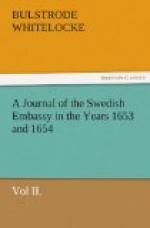[SN: Environs of Upsal.]
The prospect from the castle is very beautiful; the country round about it pleasant and fruitful, and distinguished into meadows, pastures, and arable fields, and the river Sale passing through them, which loseth itself about half a league from thence into a great lake. The river is navigable with boats of about twenty or thirty tons, many leagues together, going through the lake also; it is not muddy, nor unfurnished with the fish of those parts, and is about half as broad as the Thames at Henley. It runs at the foot of the hill on which the castle stands, and the town is built upon it; and it waters most part of the streets, to their great commodity. It is for this reason called Upsal, because Ubbo—who, they say, was the son of Gomer, the son of Japhet, the son of Noah—this Ubbo built this town upon the river Sale, and therefore called it, after his own name, Ubbo Sale, by contraction of speech now called Upsal. All agree it to be one of the most ancient of their cities, the metropolitan see of their archbishop, and in old time the residence of their kings, and where they were invested with the regal dignity. The country about it seemed one of the most pleasant and fruitful of these parts. The town itself is not much beautified with stately buildings, not above nine or ten houses being built with brick; the rest of them, after the fashion of their country, built with great bodies of fir-trees, and covered with turf; the fairest of their brick houses was that where the English Ambassador lodged.
This city hath not much trade, and therefore not much wealth. The government of it is according to the municipal law of the country, and as other cities are; their head officer is a Burgomaster, who hath for his assistants a council, in the nature of the common councils in our corporations in England, consisting of the principal burgesses and inhabitants of the city, who have power, with the Burgomaster, as to making of ordinances, and in the government.
In their journey to take the air the Resident and Whitelocke had much discourse touching the images in their church, and about the observation of their Sabbath; wherein the Resident was furnished with the usual arguments of the Papists, and was answered by Whitelocke, and was not so positive as most of his persuasion use to be. He discoursed also about the Dutch treaty in England, to get from Whitelocke what he could to report to the Danish Ambassador and Dutch Resident; for which he was fitted by Whitelocke’s answers to him.
April 23, 1654.
[SN: Whitelocke punishes two of his retinue for neglect of the Lord’s Day.]




